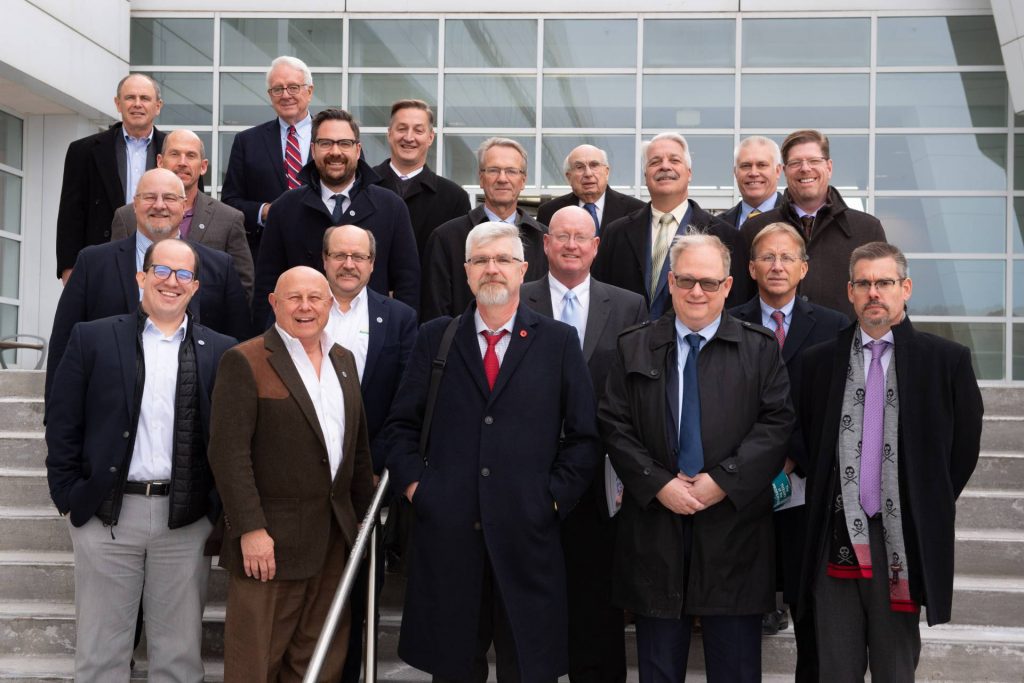 Front row: Matt Raiford, CBI; Tim Vargo, Exide Technologies; Kevin Moran, BCI; Tim Ellis, RSR Technologies; Jon Anderson, C&D. Second row: Ed Shaffer and Reed Shick, Advanced Battery Concepts; Hal Hawk, Crown Battery; Chris Pruitt, East Penn Manufacturing. Third row: Jerry Pyatt and Steve Batts, The Doe Run Company; John Howes, Redland Energy; Alistair Davidson, CBI; Dave Shaffer, EnerSys; Ray Kubis, Gridtential; Howard Meyers, RSR Technologies; Terry Murphy, Hammond; A. J. Williams, RSR Technologies; and Jim Pedersen, Teck Resources. Not shown: Dan Breidegam, East Penn and David Mihara, Microporus.
Front row: Matt Raiford, CBI; Tim Vargo, Exide Technologies; Kevin Moran, BCI; Tim Ellis, RSR Technologies; Jon Anderson, C&D. Second row: Ed Shaffer and Reed Shick, Advanced Battery Concepts; Hal Hawk, Crown Battery; Chris Pruitt, East Penn Manufacturing. Third row: Jerry Pyatt and Steve Batts, The Doe Run Company; John Howes, Redland Energy; Alistair Davidson, CBI; Dave Shaffer, EnerSys; Ray Kubis, Gridtential; Howard Meyers, RSR Technologies; Terry Murphy, Hammond; A. J. Williams, RSR Technologies; and Jim Pedersen, Teck Resources. Not shown: Dan Breidegam, East Penn and David Mihara, Microporus.CEOs Visit DOE National Laboratory to Review Collaborative Research Project
WASHINGTON, December 11, 2019 – A three-year scientific research project currently underway at the U.S. Department of Energy’s (DOE) Argonne National Laboratory is showing promising results to unlock the untapped potential of lead batteries. Lead batteries currently supply over 70% of the world’s rechargeable battery energy needs. Yet, possibilities exist to expand their performance to meet growing energy storage and transportation demands.
The project is funded by a joint industry CRADA (Cooperative Research and Development Agreement) comprised of more than 90% of the U.S. lead battery industry. They are working with Argonne scientists to study lead and its unrealized potential for batteries, which can be employed for both transportation and the nation’s energy infrastructure. The CRADA is part of the ongoing research and development by the lead battery and recycling industry, which spent more than $100 million in battery R&D in 2018, supports nearly 25,000 U.S. manufacturing jobs, and generates $26.3 billion in economic output.
Titled “Lead Battery Science Research Program (LBSRP),” the CRADA was formed on behalf of the American lead battery industry and is managed by Electric Applications Incorporated (EAI). As it enters its second year, CRADA partners, including members and staff of Battery Council International (BCI), the International Lead Association and the Consortium for Battery Innovation visited Argonne’s Chicago campus last month for a program update.
Early Results: Next-Gen Lead Batteries Ahead
“Although we’re in the early discovery stage with this project, we’re already seeing results that will help us to develop next-generation batteries to meet the huge growth in demand for reliable and secure energy storage,” said David Shaffer, president and CEO of EnerSys, a Pennsylvania-based battery manufacturer. Shaffer, who also leads the BCI board of directors, is interested in how the findings will translate to real world products.
“The goal of all our companies is to constantly improve performance in lead battery technology – especially cycle life and dynamic charge acceptance.” He said the work at Argonne further underscores the importance of government collaboration with American industry to develop next-generation batteries, manufactured domestically for use in vehicle and grid applications.
Argonne’s High-Tech Capabilities
Argonne is a pioneering science and engineering research center, where talented scientists and engineers work together toward pivotal discoveries to answer the biggest questions facing humanity. The lab has a strong battery research program and is home to the Advanced Photon Source (APS), a DOE Office of Science User Facility. The APS provides ultra-bright, high-energy, storage ring-generated X-ray beams that allow researchers to see deep within a battery’s lead to identify complex chemical reactions in real-time.
Dr. Venkat Srinivasan, director of the Argonne Collaborative Center for Energy Storage Science (ACCESS), explained the significance of the research. “Look at where the world is going over the next 10, 20 and 30 years, and energy storage is crucial for all of that.” Though research findings are pending, Dr. Srinivasan, explained why Argonne is uniquely positioned to advance breathtaking innovation.
“We are able to assemble big teams to solve big problems,” said Dr. Srinivasan. The laboratory also has specialized equipment to facilitate research that few, if any, companies could build and operate on their own. “We want to move the ideas we have out to industry, and what you [the lead battery industry] are doing is critical to us.”
Lead Batteries: Proven, Reliable, Sustainable
The transition to greater decarbonization, driven by a desire for renewable energy sources that reduce greenhouse gas emissions, will require a portfolio of battery chemistries and technologies to meet the demand. The lead battery industry offers a proven and reliable technology that can be delivered today, at scale, and sourced from domestic materials, unlike newer battery technologies.
Truly “clean” energy demands a sustainability profile, as exemplified by lead batteries’ closed-loop model recognized by the World Economic Forum as a perfect example of a circular economy. The nationwide infrastructure of the lead battery industry keeps more than 129 million lead batteries out of landfills annually by recycling 99% of lead batteries.
Learn More at Essential Energy Everyday
Essential Energy Everyday exists to increase awareness of the critical importance of lead batteries in powering our daily lives and future. It encourages continued investment in sustainable lead battery technology to store and provide energy on demand. Its initiative is supported by the two global trade associations that represent the lead battery and lead industries, Battery Council International and the International Lead Association.
About Battery Council International
Battery Council International is the North American trade association representing lead-based battery manufacturing, supply, recycling and distribution companies. For more information, visit Battery Council International.


